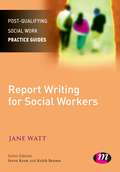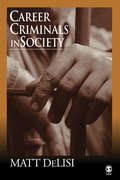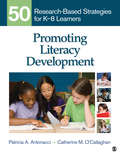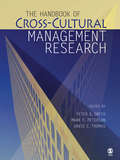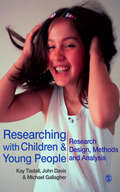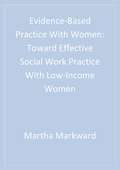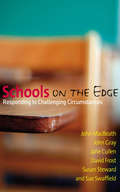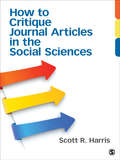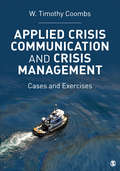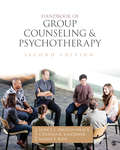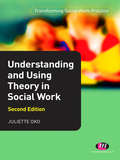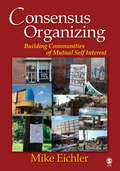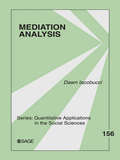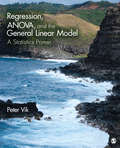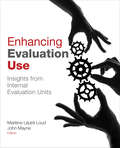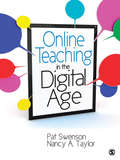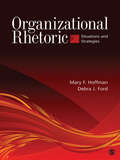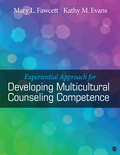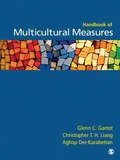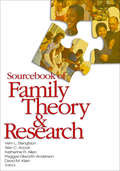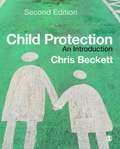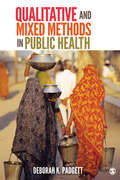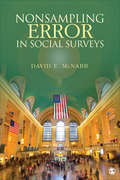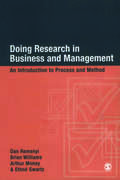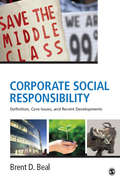- Table View
- List View
Report Writing for Social Workers (Post-Qualifying Social Work Practice Guides)
by Jane WattMany students and qualified workers in all areas of social work feel apprehension at the prospect of writing a formal report for a court or tribunal. Writing may be a fundamental skill, but it is one that students and practitioners cannot afford to take for granted. Recent reviews (Baby P, Serious Case Review processes) highlighted the need for clear reports, recording and written communication between professionals. This practical and accessible textbook presents the report writing process in a clear and straightforward way. From methods of collecting and presenting evidence, to drawing conclusions and writing up a final report.
Career Criminals in Society
by Matt DeLisiMore than a century of scientific research has indicated that the majority of crime that occurs in society is committed by a small percentage of the population, meaning that most criminals are repeat offenders, or "career criminals." If societies devoted considerable resources toward preventing and neutralizing career criminals, there would be dramatic reductions in crime, the fear of crime, and the assorted costs and collateral consequences of crime. Career Criminals in Society examines the small but dangerous group of repeat offenders who are most damaging to society. The book encourages readers to think critically about the causes of criminal behavior and the potential of the criminal justice system to reduce crime. Author Matt DeLisi draws upon his own practitioner experience, interviewing criminal defendants to argue that career criminals can be combated only with a combination of prevention efforts and retributive criminal justice system policies. Key FeaturesUses an engaging writing style to provide a comprehensive overview of career criminalsProvides chapter-opening vignettes developed from real criminal casesExamines various crime prevention strategies to neutralize criminal careers Explores the international relevance of career criminalsDraws upon research from the fields of criminal justice, criminology, psychology, sociology, and human developmentWith its controversial, thought-provoking style, Career Criminals in Society is sure to advance theory and research on chronic offenders and inspire discussions on how to adequately control crime. It is an excellent supplementary textbook for undergraduate and graduate courses on criminology, criminal behavior, crime typologies, deviant behavior, and crime control and prevention.
Promoting Literacy Development: 50 Research-Based Strategies for K-8 Learners
by Patricia A. Antonacci Catherine M. O′CallaghanFifty research-based literacy strategies designed for busy K-8 classroom teachersOrganized around 10 key areas for teaching and learning literacy—phonemic awareness, phonics, reading fluency, vocabulary, story comprehension, comprehension of informational text, questioning for understanding, discussion for understanding, narrative writing, and writing to learn-Promoting Literacy Development offers 50 clearly written, step-by-step strategies for developing proficient readers and writers. The authors also include suggestions for differentiating instruction for English language learners and for students with special needs.
The Handbook of Cross-Cultural Management Research
by David C. Thomas Mark F. Peterson Peter B SmithRenowned international experts Peter B. Smith, Mark F. Peterson, and David C. Thomas, editors of the The Handbook of Cross-Cultural Management, have drawn together scholars in the field of management from around the world to contribute vital information from their cross-national studies to this innovative, comprehensive tome. Chapters explore links between people and organizations, providing useful cultural perspectives on the most significant topics in the field of organizational behavior—such as motivation, human resource management, and leadership —and answering many of the field′s most controversial methodological questions. Key Features Presents innovative perspectives on the cultural context of organizations: In addition to straightforward coverage of structures and processes, this Handbook addresses locally distinctive, indigenous views of organizational processes from around the world and considers the interplay of climate and wealth when analyzing how organizations operate. Offers an integrated theoretical framework: At the start of each substantive section, the Editors provide context for the upcoming chapters by discussing how prevalent cultures in different parts of the world place emphasis on particular aspects of organizational processes and outcomes. Boasts a global group of contributing scholars: This Handbook features contributing authors from around the world who represent an outstanding mix of respected, long-standing scholars in cross-cultural management as well as newer names already impacting the literature. Provides an authoritative agenda for the future development of the field: All chapters conclude with a list of promising avenues for further research and a focus on issues that remain unresolved.Intended AudienceThis Handbook is an ideal resource for researchers, instructors, professionals, and graduate students in fields of business, management, and psychology.
Researching with Children and Young People: Research Design, Methods and Analysis
by Michael Gallagher John Emmeus Davis E Kay Tisdall′This text will be of great use to postgraduate researchers in education, social work and nursing, and any practitioner involved in carrying out research with children and young people′ - CPD Update ′[T]here is a sense of newness and innovation about the book, whereby the reader is treated to insight into the life and work of collaborators who wrote each case study....[T]he book is highly accessible for students at graduate and undergraduate level, for example BA (Hons) Early Childhood Studies students′ - ESCalate Researching with Children and Young People covers every stage of the process of doing a research project, from research design and data collection, through to analysis and writing up. The book is divided into three sections, in which the authors cover: - Introducing research and consultation with children and young people - Collecting and analysing data - Whole-project issues. Each chapter includes activities, discussion questions, tips and extended case studies to help the reader to engage with the material and investigate the practical implications. This text will be of great use to postgraduate researchers in education, social work and nursing, and any practitioner involved in carrying out research with children and young people.
Evidence-Based Practice With Women: Toward Effective Social Work Practice With Low-Income Women (Evidence-Based Practice in Social Work)
by Bonnie L. Yegidis Martha J. MarkwardThe first book to focus on evidence-based social work practice with low-income womenThis one-of-a-kind book presents evidence-based coverage of the assessment and treatment of the most common mental health disorders among women, particularly low-income women. For each disorder— depression, post-traumatic stress disorder and trauma (including sexual abuse), generalized anxiety disorder, substance use disorder, and borderline personality disorder—the authors include assessment instruments and detailed case examples that illustrate the assessment and treatment recommendations.
Schools on the Edge: Responding to Challenging Circumstances
by David Frost Sue Swaffield Susan Steward Jane Cullen John M Gray John MacBeath′An ideal text for challenging the thinking of those studying for NPQH… The conclusion by the authors suggests nine major points to consider if improvement for schools in extremely challenging circumstances is to happen and be sustained. These ′nine lesson for policy makers′ are very frank and pertinent points, let′s hope at least some of our policy makers read them!′ - ESCalate ′Rarely does a book on education reform capture both the big and the small picture with such brilliant clarity. MacBeath and his colleagues furnish a ′no holds barred′ account of the ins and outs of understanding and assessing the impact of schools struggling for success. A fascinating read′ - Michael Fullan, Professor Emeritus, OISE/University of Toronto Schools serving young people on the margins of society face a major challenge in trying to create an environment where students can succeed. The book examines key issues in the field of school improvement. More specifically, it draws on evidence from the SFECC (Schools Facing Exceptionally Challenging Circumstances) project to explore: o the policy context of schools on the edge o the nature of extreme challenges o the way schools have responded to extreme challenge o what seems to be effective in helping such schools to meet the challenge o obstacles to success and the facilities and resources that can make a difference o strategies to meet the needs of the local community and facilitate lasting change. Each of the authors has wide experience of school effectiveness and improvement, and of working with schools in disadvantaged communities in Britain, the USA and many other parts of the world. School leaders, local authorities, practitioners and all those involved in any aspect of school leadership and school improvement will find this book highly pertinent.
How to Critique Journal Articles in the Social Sciences
by Scott R. HarrisThis brief, introductory book provides readers with a step-by-step guide to reading and understanding a social science research article. The author demonstrates the many strengths of social research, including its advantages over ordinary ways of knowing things, and, at the same time, points out that research is inevitably flawed. Rather than naively assuming that good research simply produces "The Truth" or cynically asserting that research is hopelessly biased and futile, this book instills in readers a critical perspective—one that appreciates the strengths and weaknesses of any piece of scholarship.
Applied Crisis Communication and Crisis Management: Cases and Exercises
by Timothy CoombsDesigned to give students and public relations professionals the knowledge and skills they need to become successful crisis managers, this practical book includes a wide range of cases that explore crisis communication and management in action. In the first two chapters, the author introduces key theories and principles in crisis communication, which students apply by analyzing 17 cases drawn from recent headlines. Cases are explored from pre-crisis, mid-crisis, and post-crisis communication perspectives, and include a range of predominant crisis scenarios from product recalls to lawsuits to environmental disasters
Handbook of Group Counseling and Psychotherapy
by Cynthia R. Kalodner Maria T. Riva Janice L. DeLucia-WaackThe most comprehensive and thoroughly researched text available on this topic, Handbook of Group Counseling and Psychotherapy, Second Edition underscores the notion that group work is improved through increased collaboration between researchers and practitioners. Edited by renowned leaders in the field, this thoroughly updated and revised Second Edition explores current literature and research and offers suggestions for practice in psycho-educational, counseling, and therapy groups. The Handbook is divided into five main sections: current and historical perspectives, best practices, multicultural and diverse groups, groups in special settings, and an introduction to special topics.
Understanding and Using Theory in Social Work (Transforming Social Work Practice Series)
by Juliette OkoUnderstanding how theory informs social work practice is an area that students can find challenging and complex. This book helps students to understand how theory impacts and informs social work practice. Updated with a new introduction by the author, subjects covered include values and ethics, organisational contexts and putting theory into practice. There is a chapter on the relationship between theory and practice in social work which examines notions of empowerment and concepts of social exclusion and the distinctive role of the social work practitioner. Critical thinking exercises are built into the text to aid learning and reflective thinking.
Consensus Organizing: Building Communities of Mutual Self Interest
by Michael P. EichlerEmpowering a community takes more than organizing and mobilizing its people; it takes a simple, yet radical, notion that consensus can be reached by creating mutual self interest between key individuals in the community and players of interest. In Consensus Organizing: Building Communities of Mutual Self Interest, author Mike Eichler shows how even poor and disempowered communities can achieve lasting results by implementing some key consensus organizing strategies. Through personal, lively, and relevant examples, Eichler takes the reader on a road trip through various communities and shows how collectively they were able to reach lasting results by finding key areas where consensus could be reached. Key features: The author shares his twenty-five years of experience as a community organizer, including the development of a national effort to train young people as consensus organizers in diverse locations such as Las Vegas, New Orleans, and New York City. Demonstrates how consensus organizing can be applied to a variety of settings, including public education, housing, economic development, health and crime. Gives readers the opportunity to learn more about themselves: It helps students to see the other side of any situation and understand how common ground can be achieved. It is written in a student-friendly, conversational manner, which will make students feel as if they have taken a journey with the author, struggled with the various communities, won the victories with the disempowered, and had a few laughs along the way. Intended audience: This book can be used as a core textbook for courses in community organizing and as a supplemental volume in various macro social work courses on community practice. It can also be used in departments of social work, urban planning, public administration, and public health.
Mediation Analysis (Quantitative Applications in the Social Sciences #156)
by Dawn IacobucciThis book covers mediation analysis—the examination of whether an effect of one variable on another is direct or indirect or both. Author Dawn Iacobucci offers thorough coverage of introductory and advanced material as well as conceptual and statistical information. The book begins by introducing arguments of causality, and proceeds to examine current options for analyzing data patterns purported to exhibit meditational structures. Iacobucci shows direct and indirect paths via causal paths, regression, and structural equations models. She also grounds readers in a popular structural equations modeling approach so they can implement the statistical methods discussed in testing for evidence of mediation in a variety of empirical contexts. Intended Audience This book is appropriate for any course in regression and correlation, sociological research methods, quantitative research methods, quantitative techniques in Business & Management, Psychology, Political Science, or Public Policy departments.
Regression, ANOVA, and the General Linear Model: A Statistics Primer
by Peter Wright VikPeter Vik′s Regression, ANOVA, and the General Linear Model: A Statistics Primer demonstrates basic statistical concepts from two different perspectives, giving the reader a conceptual understanding of how to interpret statistics and their use. The two perspectives are (1) a traditional focus on the t-test, correlation, and ANOVA, and (2) a model-comparison approach using General Linear Models (GLM). This book juxtaposes the two approaches by presenting a traditional approach in one chapter, followed by the same analysis demonstrated using GLM. By so doing, students will acquire a theoretical and conceptual appreciation for data analysis as well as an applied practical understanding as to how these two approaches are alike.
Enhancing Evaluation Use: Insights from Internal Evaluation Units
by Marlène Läubli Loud and John MayneEnhancing Evaluation Use: Insights from Internal Evaluation Units offers invaluable insights from real evaluators who share strategies they have adopted through their own experiences in evaluation. Readers will learn about the challenges, solutions, and lessons drawn from the experience of evaluators working in a wide range of organizations. Referencing the latest literature, contributors discuss factors that help or undermine attempts to foster an evaluative thinking and learning culture within an organization. Applicable in a wide range of situations, their accounts demonstrate the initiative and innovative thinking they use to address challenges in various, sometimes complex, evaluation settings. Questions at the end of each chapter stimulate thought and discussions about the issues raised and allow readers to apply their findings to their own situations. "This book speaks to a cutting-edge topic, that is, the potential to generalize program evaluation expertise to larger organizational questions, and the cases from multiple international contexts represent a unique feature." —John Clayton Thomas, Georgia State University "The use of actual cases to highlight major concepts in evaluation in the public sector is a great feature." —Danica G. Hays, Old Dominion University "The text provides practical information from a variety of organizational contexts and the integration of international experiences provides for expanded discussion of evaluation theory and practice." —Kathleen Norris, Plymouth State University "The key strengths of this book lie in its national, supra-national and international organizational contexts, its consistency in insider perspectives, and the detailed examples provided." —Donna Haig Friedman, University of Massachusetts, Boston "The book of essays reviewed here was edited by two eminent evaluators. It fills an important gap in the literature: in pursuit of improved quality of evaluation products, evaluation thinkers have lavished attention on evaluation methods, ethics and use but they have sorely neglected evaluation governance issues and have largely failed to probe the workings of evaluation within organizations. Yet, most evaluations are commissioned by (or undertaken within) organizations. The choices organizations make in structuring evaluation functions and designing evaluation processes have a major bearing on the relevance, validity and usefulness of evaluations. Refreshingly, the book offers fresh mental models and practical lessons about evaluation systems and practices adopted in diverse organizational settings. All contributors to the book are seasoned practitioners. They hail from national, supranational and international organizations and many of them have trespassed across these thematic and organizational boundaries. They all are equipped to draw on a vast reservoir of hands---on experience as evaluation commissioners, managers, internal evaluators or external practitioners. Remarkably, they also display considerable familiarity with relevant themes treated by the organization management and evaluation literature. Given its pragmatic focus the book is bound to elicit broad based interest among evaluation practitioners. While it addresses familiar dilemmas and challenges (evaluation independence, evaluation utilization, organizational learning, nurturing of an evaluation culture, etc.) it does so from the distinctive perspective of "insiders" who have had to contend with a variety of organizational constraints and management pressures. Revealingly most contributors find good reasons to be optimistic about the possibility of positive change. The stage is set by John Mayne whose introductory and authoritative chapter identifies the critical importance of organizational factors in the utilization of evaluation results. This is followed by Bastiaan de Laat’s chapter which puts forward
Online Teaching in the Digital Age
by Patricia Jane Swenson Nancy Annette TaylorThe essential guide to teaching in a virtual environmentOnline Teaching in the Digital Age provides educators with the essential knowledge needed to successfully develop and teach an online course. Throughout this practical hands-on guide, the authors offer 15 years of personal online teaching experience in language accessible to both the novice and advanced online educator. Developed through theory and practice, the text shows educators how to take the materials used in a traditional classroom and transfer them to a new virtual environment. Additionally, it gives educators the confidence and skills needed to run real-time (synchronous) and time-arranged (asynchronous) online discussions. Most reassuring of all, this book shows that few traditional course elements need to change in order to start teaching online.
Organizational Rhetoric: Situations and Strategies
by Mary F. Hoffman Debra J. FordAn unprecedented text explains how to analyze the role of rhetoric in organizationsIntegrating rhetorical theories and methods with principles of organizational communication, this pioneering text provides students with a step-by-step method for analyzing and critiquing examples of organizational rhetoric. The first half of the book offers an accessible introduction to rhetorical research, theory, and criticism and equips students for analyzing the messages of organizations in a variety of contexts. The second half focuses on needs in real-life organizational situations: to create and maintain identity; to manage messages about issues, risk, and crisis; and to communicate with those "inside" the organization.Contemporary examples and case studies (including a dispute over clean energy in Texas, efforts on the part of restaurant owners in New York to fight food labeling requirements, and a university′s announcement that it is building a "body farm") illustrate the importance of this area of study and provide opportunities for students to apply their emerging analytical and critical thinking skills.Key FeaturesGrounds the explanation and critique of persuasive organizational messages in traditional and contemporary rhetorical literatureShows students how to critique the messages organizations use to create and maintain organizational powerDemonstrates the importance of rhetoric to the success of the organizationUses case studies and accompanying worksheets to help students move through the process of analyzing sample situations and messagesCovers image/impression management, issue management, crisis management, and other key facets of organizational rhetoricIncludes models of the book′s method for analysis at the beginning of each chapter to help students visualize how each step fits into the larger systemIntended AudienceOrganizational Rhetoric: Situations and Strategies is ideal for a wide range of courses at the upper-level undergraduate and master′s level, including Organizational Communication, Organizational Studies, Public Relations, and Rhetorical Studies. This first-of-its-kind textbook is also an essential addition to the libraries of Communication/Rhetoric and Business instructors.
Experiential Approach for Developing Multicultural Counseling Competence
by Mary L. Fawcett Kathy M EvansThis text is an ideal companion for anyone preparing for a career in counseling or mental health, applicable to all core courses in the counseling curriculum and developmentally designed to build multicultural and diversity competencies from a beginning to advanced level. As a mental health- worker-in-training you will need to learn to work effectively with clients from diverse backgrounds, and this text provides a ready-made resource of multicultural and diversity activities to enhance your classroom learning. This book is structured around the nine core areas of the Multicultural Counseling Competencies (MCCs). These competencies are designated by the Council for Accreditation of Counseling and Related Educational Programs (CACREP) to help you learn the critical areas of personal and racial identity, develop an awareness of your own cultural values and biases (knowledge, awareness, and skills), and to build an understanding of both the counselor and client′s worldviews. The book devotes three final chapters to culturally appropriate intervention strategies that again strengthen your awareness, knowledge, and skills.
Handbook of Multicultural Measures
by Glenn C. Gamst Aghop Der-Karabetian Christopher T. Liang"One of the most challenging tasks for multicultural researchers is finding psychometrically robust and practical measures. For years I have been waiting for one comprehensive source of empirically supported measures to help guide my work. Finally it has arrived! This Handbook of Multicultural Measures is the most complete and up-to-date compendium of promising instruments for research in all areas of cultural psychology. Graduate students and seasoned researchers who often spend weeks trying to locate appropriate measures for their research, will now identify the best measure for their study in one day, thanks to this complete and highly readable text." —Joseph G. Ponterotto, Fordham UniversityProviding readers with cutting-edge details on multicultural instrumentation, theories, and research in the social, behavioral, and health-related fields, this Handbook offers extensive coverage of empirically-supported multicultural measurement instruments that span a wide variety of subject areas such as ethnic and racial identity, racism, disability, and gender roles. Readers learn how to differentiate among and identify appropriate research tools for a particular project. This Handbook provides clinical practitioners with a useful starting point in their search for multicultural assessment devices they can use with diverse clients to inform clinical treatment.
Sourcebook of Family Theory and Research
by Katherine R. Allen David M. Klein Alan C. Acock Peggye Dilworth-Anderson Vern L. BengstonNow available in paperback for classroom use!"This comprehensive text provides a rich source of perspectives on theorising about the family for scholars, researchers, and students. Another of the book′s strengths is the emphasis on multimethod approaches in family research. The book covers an impressive range of topics and issues - marital happiness, adjustment of children in divorce marriages, gay marriage, sibling ties, ethnic families of colour, stepfamilies, aggression culture, work and family, religion, and social policy, to name a few. In summary, this superb volume is highly recommended and amply reflects the many contemporary perspectives on the family." —Philip Siebler, Monash University, VictoriaSponsored by the National Council on Family Relations, the Sourcebook of Family Theory and Research is the reference work on theory and methods for family scholars and students around the world. This volume provides a diverse, eclectic, and paradoxically mature approach to theorizing and demonstrates how the development of theory is crucial to the future of family research. The Sourcebook reflects an interactive approach that focuses on the process of theory building and designing research, thereby engaging readers in "doing" theory rather than simply reading about it. An accompanying website offers additional participation and interaction in the process of doing theory and making science. Editors Vern L. Bengtson, Alan C. Acock, Katherine R. Allen, Peggye Dilworth-Anderson, and David M. Klein have brought together a prominent group of diverse contributors ranging in race and ethnicity, age and seniority, and gender and sexual orientation. The Sourcebook begins with a section that sets the context for future family research. The subsequent sections explore changing family patterns, changing family interactions within and across generations, and families and larger social forces. A concluding section discusses issues of teaching family theories and research.Key Features Focuses on the process rather than the outcomes of family theory and research methods Emphasizes the value of multi-methods approaches in family research by integrating theory development with the development of research methods Differs from many other publications on family research by describing the development of new ideas rather than just summarizing existing findings The interactive Web site and the special feature boxes within the chapters engage readers with theory and methodology. Boxed features include Case Studies, Spotlights on Theory, Spotlights on Methods, and a Discussion and Extension sections. Represents a "Who′s Who" of family researchers with contributions from many of the best researchers in the family realm The Sourcebook will be an excellent addition to any academic library. It is an authoritative reference for scholars and researchers in Human Development and Family Studies, Sociology, Social Work, and Psychology. In addition, the Sourcebook can also be used in graduate courses on family theory and methodology.
Child Protection: An Introduction
by Chris BeckettPraise for the First Edition: `All readers will be drawn to the style of the book as well as its content. The structure will make sure that it is not just a "one-off", being read as part of a course of study, but a book which is used frequently as a source of reference′ - Child Abuse Review The Second Edition of this best-selling textbook provides students and practitioners with a broad introduction to, and critical analysis of, the complex issues involved in child protection work. Beckett unpacks these complexities in a clear and engaging way, all the time encouraging reflection and debate through such features as case examples and interactive exercises. The book is fully comprehensive, considering key topics such as: the consequences for children of abuse and neglect; the reasons why some adults abuse and neglect children; the personal challenges involved in doing child protection work; and the organizational framework within which child protection work takes place. Other key features of this thoroughly revised Second Edition include: " Fully updated content: the book has been revised to incorporate new literature, research, legal and policy developments, including the recent Working Together guidelines " Two new chapters: these comprise a chapter on domestic violence in families, and a chapter on bringing about change " Interprofessional appeal: the author addresses all the professionals involved in child protection work, ensuring relevance across a range of disciplines and professions. The new edition of this highly successful textbook will be required reading for students studying social work and allied subjects, and an essential resource for all professionals involved in child protection work. Chris Beckett is based at the Division of Social Work and Social Policy, Anglia Ruskin University. He is the author of three best-selling SAGE textbooks: Human Growth and Development; Values and Ethics in Social Work (with Andrew Maynard); Essential Theory for Social Work Practice.
Qualitative and Mixed Methods in Public Health
by Deborah K. PadgettPublic health research methods for the 21st centuryDesigned to meet the needs of public health students, practitioners, and researchers, this exciting and contemporary new text from the author of Qualitative Methods in Social Work Research, Second Edition offers a firm grounding in qualitative and mixed methods, including their social science roots and public health applications. It uniquely addresses two profound changes taking place in public health in the 21st century: the explosion of interest in global public health, and the growing reliance on community-engaged research methods. The author brings public health to life through the use of real-world case studies drawn from the author′s funded research projects in breast cancer screening as well as homelessness and mental illness.
Nonsampling Error in Social Surveys
by David E. McNabbA welcome and much-needed addition to the literature on survey data quality in social research, McNabb’s book examines the most common sources of nonsampling error: frame error; measurement error; response error, nonresponse error, and interviewer error. Offering the only comprehensive and non-technical treatment available, the book’s focus on controlling error shows readers how to eliminate the opportunity for error to occur, and features revealing examples of past and current efforts to control the incidence and effects of nonsampling error. Most importantly, it gives readers the tools they need to understand, identify, address, and prevent the most prevalent and difficult-to-control types of survey errors.
Doing Research in Business and Management: An Introduction to Process and Method
by Arthur Money Dan Remenyi Brian Williams Ethne Swartz′[T]here is, as with all the chapters, an excellent set of suggested further reading...′ - Management Learning `Postgraduate students should find this a useful book, since it focuses on issues specific to their requirements. The philosophical underpinnings, methodology and practicalities of research are all discussed within the context of postgraduate research′ - International Small Business Journal This wide-ranging text comprehensively overviews management research and research methodology. The authors take the reader through all the major stages of the research process and introduce the key methods. After highlighting the different contexts and purposes, strategies and tactics, programmes and processes of management research, the authors provide detailed coverage of the relevant research approaches and methods. They discuss the interrelationship of theoretical and empirical research, and how these apply to practice. The implications of using quantitative and qualitative methods are examined, and practical advice is given on the available analysis techniques and software packages.
Corporate Social Responsibility: Definition, Core Issues, and Recent Developments
by Brent D. BealThis unique supplemental text offers a well-structured and thorough introduction to corporate social responsibility (CSR). Author Brent D. Beal introduces the basic concept of CSR, briefly discusses the challenges of defining it, and summarizes important conceptual models. CSR is examined in the context of the perfect competition market model, market failure, and social dilemmas. Three different types of CSR—systemic, strategic, and philanthropic—are highlighted. Finally, arguments both for and against CSR are outlined and several conceptual frames are proposed. Readers are encouraged to think about what businesses should be responsible for in society and how a society’s economic system should be structured, bounded, and ultimately, controlled. This text is appropriate for any business course in which the introduction of CSR would complement other course content.
